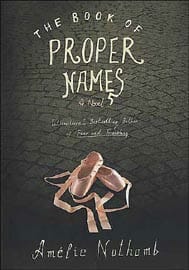
Amelie Nothomb is a cult figure in Europe but little known stateside. Judging by The Book of Proper Names, her narrative style is oddly sparse—somewhere between fable-like simplicity and screenplay treatment:
“‘Why did you kill your husband?’ ‘The baby in my belly had hiccups.’ … ‘You killed your husband to get rid of your baby’s hiccups?’ She laughed. ‘No, that would be absurd. … He wanted to call it Tanguy if it was a boy and Joelle if it was a girl.’ … She frowned. She felt that her argument lacked a certain something, and yet she was sure she was right. She understood perfectly what she had done, and found it all the more frustrating that she couldn’t explain it. So she decided to say nothing.”
This early scene foreshadows the amoral special treatment that will dominate the life of the unborn daughter, Nothomb’s heroine. It also exemplifies Nothomb’s narrative terseness, which creates a sense of large, unspeakable motives behind the action—at least until we begin to suspect that there’s nothing at work in the life of the heroine but a selfishly indulged romanticism. The book’s abrupt finale suggests that Nothomb herself is so overawed by her self-absorbed main character that she can’t decide how to end the story. But credit the author for not making her novel—at 122 pages, nearly as anorexic as its ballerina heroine—any thicker than her ideas.